TODAY’S READING FROM THE OLD TESTAMENT- Ezekiel 24:1-26:21.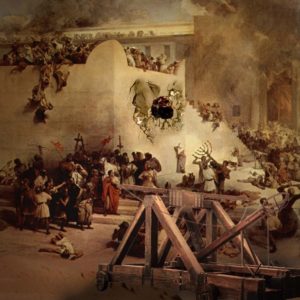
September 11, 2001 has been marked as the day the United States suffered horrific terrorist attacks at the hands of Al Qaeda. December 7, 1941 is remembered as ‘a day that will live in infamy’ due to the Japanese attack on Pearl Harbor. The Lord tells Ezekiel to record that January 15, 588 B.C. is to be recorded as the fateful day when the King of Babylon launched his siege against Jerusalem. The day that Ezekiel and Jeremiah foretold was at hand. This paved the way for Judah’s fall and the destruction of the temple. Indeed, it was ‘a day of infamy’ (Ezekiel 24:1-2).
On the evening of the same day, Ezekiel’s wife, whom he called his ‘delight’, died suddenly. The Lord told Ezekiel that it would happen beforehand and instructed him not to mourn for her publicly, but only groan silently. He was permitted to sigh, but not aloud. This would be a sign to the people that Jerusalem, Yahweh’s delight, had fallen. The lack of outward mourning and the demand for inward groaning, possibly reflected the fact that in Babylonian captivity any outward mourning of their military conquests would be seen by their captors as seditious. Another interpretation, and one that fits with the prophetic context, is that because of the righteousness of God’s judgment on Jerusalem there should be no weeping or mourning.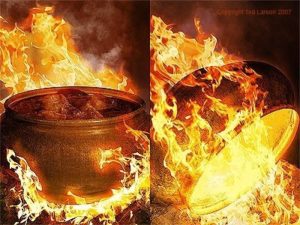
On this date, Ezekiel was to proclaim another parable, “The Cooking Pot Song”, Chapter 24:3-5. This was similar to the previous songs describing God’s judgment on Judah, ‘the sword song’ (21:8-17) and ‘the cup song’ of Chapter 23:32-34. However, those songs were looking to the future. This song was describing what was happening to Jerusalem at that moment. The day of Jerusalem’s fall had already arrived. The Babylonian attack on Jerusalem would be fierce and brought to a boil. The meat, representing the inhabitants of Jerusalem, in the pot of the city, would experience the violence and destruction. Verses 6-8 and 9-12 are interpretive speeches. A ‘Woe’ (curse) was pronounced on Jerusalem because it was a city known for its bloodshed and violence. It was a pot encrusted with residue. Its filth that made it unfit for use. God would pile the wood so high to fuel the fires of judgment so that it would burn hot. The pot’s contents would be cooked, charred (v.10) and then poured on the fire and burned away.
Lamar Eugene Cooper writes in his commentary on Ezekiel,
“God especially condemned Judah for callous disregard for the sanctity of human life (24:1-14). This indifference to human life was evident in the proliferation of crimes of violence and the lack of compassion for the innocent victims of those crimes. The severe judgment sent by God upon Judah should be ample warning to those today who share the same callous disregard for the value of human life, both the born and the unborn.” (The New American Commentary on Ezekiel, p. 237)
The restrictions that were put upon Ezekiel in Chapter 3:25-27 would come to an end at the fall of Jerusalem. Because Judah was a rebellious house, Ezekiel remained mute to it, only speaking when God opened his mouth with a prophecy. Now that his prophecies had come to pass, he has gained credibility and is free to speak to the fugitives who flee from the city.
Ezekiel 24: 27 27 On that day your mouth will be opened to the fugitive, and you shall speak and be no longer mute. So you will be a sign to them, and they will know that I am the LORD.”
The Book of Ezekiel is divided into three parts. Chapter 24 concludes the first part containing the words of judgment for Israel and Judah (Chapters 1-24).
Chapter 25 marks the beginning of the second section, the words of judgment for the nations (Chapters 25-32).
The third and final section of the Book of Ezekiel will include the words of hope and restoration (Chapters 33-48).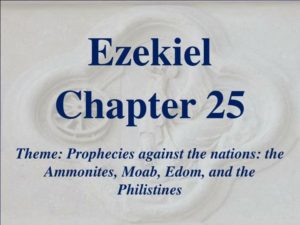
The first four of the seven prophecies pronouncing judgment on the nations are found in Chapter 25, and the remaining three are found in Chapters 26-32. The prophecies in Chapter 25 correspond to the ones given in Isaiah (15:1-16:14; 21:11-12; 34:5-17; 14:29-32), Jeremiah (49:1-6; 48:1-47; 49:7-22; 47:1-7) and Amos (1:13-15;2:1-3;1:11-12; 1:6-8).
Ezekiel is told to prophesy against the Ammonites (25:1-7), the Moabites (25:8-11), the Edomites (25:12-14), and the Philistines (25:15-17). In Chapter 26 he is told to prophesy against Tyre, predicting its destruction by the King of Babylon (See Isaiah 23:1-18 and Amos 1:9-10). Ezekiel’s prophecy against Tyre will occupy three chapters (26-28).
The One Year Bible Companion published by Tyndale House Publishers contains this note:
“The judgments in these chapters are not simply vengeful statements of Jews against their enemies; they are God’s judgments on nations that failed to acknowledge the one true God and fulfill the good purposes God intended for them. The Ammonites were judged because of their joy over the desecration of the temple (25:1-7), the Moabites because they found pleasure in Judah’s wickedness (Ezek 25:8-11), the Edomites because of their racial hatred of the Jews (Ezek 25:12-14), and the Philistines because they sought revenge against Judah for defeating them in battle (Ezek 25:15-17).
History proves the accuracy of these prophecies. When attacked by the Babylonians, Ammon would be destroyed and never appear again (25:7).
Ezekiel devotes four prophecies exposing the sin of Tyre and predicting its destruction. Tyre was the capital of Phoenicia (26:1-21; 27:1-36; 28:1-10, 11-19). The city of Tyre was located partly on the Mediterranean coast and partly on an island, one half a mile from the coast. Ezekiel uses the appropriate image of a storm that produces huge waves that crash upon the city walls and bring them down to ruin. The name ‘Tyre’ means rock, so the prophecy of the result of God’s judgment was appropriate.
“I will make her like a bare rock” (26:4). The prophesied destruction comes true and the city became like a bare rock where fishermen would dry their nets.
TODAY’S READING FROM THE NEW TESTAMENT – Hebrews 11:1-16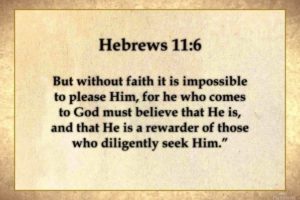
The writer of Hebrews is admonishing the Jewish believers to hold fast to the gospel- the good news that all that was promised in the Old Testament has found its fulfillment in Christ. True saving faith is believing what God has said about Himself and His plan of salvation. Clearly, the offering of bulls, goats and lambs did not save God’s people. They were place-holders for the perfect person and perfect work of the perfect priest.
The writer asks his hearers to look to Jesus, the substance, and not to the shadows of the old covenant temple worship. Jesus is God’s covenant promise fulfilled.
In Hebrews 11 the writer lists those who believed God’s promise, and they received the reward of knowing that they were pleasing God in doing so. They believed God’s promise would come to pass, even if it weren’t going to happen in their lifetime. They received God’s commendation, for without faith it is impossible to please God, because anyone who comes to Him must believe that He exists and rewards those who diligently seek Him (11:6).
Verse 1 is a description of faith, not a definition. We can describe the sky as being blue, but not everything that is blue is sky. We can describe faith as having assurance of the things you hope for, and recognizing the evidence of things not yet seen, but not all who are fully assured that they will receive what they hope for, have true faith. Not all who are convinced about what they hope for have their hopes based on what God has expressly promised in His Word. The source of these believers’ hope was not their wishes, desires, and imaginations. The heroes of faith listed in Chapter 11 believed God’s self-revelation and promises in His Word and obeyed Him, trusting Him to bring to pass what He has promised. Noah was not hoping for an opportunity to build an ark to save his household from a universal sentence of death. But when God told him of the reality of the coming judgment in the flood, he believed God’s word and obeyed His direction for the saving of his household.
And so, we see what all these people listed have in common. They heard God’s word, believed it and obeyed it. They obeyed, knowing that God is faithful to deliver what He has promised in His Word, in His way, and in His time.
Abel, Enoch, Noah, and Abraham, all received the witness within, that they were credited with righteousness for believing God (Hebrews 11:4, 5, 7). This reality is spelled out clearly in Abraham, a model believer (Genesis 15:6). Abraham “considered Him faithful who had made the promise” (11:11).
Hebrews 11:13 13 All these died in faith, without receiving the promises, but having seen them and having welcomed them from a distance, and having confessed that they were strangers and exiles on the earth.
What about you? Have you agreed with what God has said about the transitory nature of this world, the reality of sin and the consequence of sin being death? Do you agree with what God says about the future judgment, and your need for a Savior? Have you recognized that Jesus is that perfect Savior, and that there is no other way to be saved from God’s wrath but to trust in Him who offered Himself to take sin’s penalty in your place?
Faith is believing God. “Believe in the Lord Jesus and you will be saved.” (Acts 16:31).
TODAY’S READING FROM THE BOOK OF PSALMS- PSALM 110:1-7
Psalm 110 is the great Messianic Psalm that we have been hearing about in the Book of Hebrews.
The six opening words are the key to this Psalm. “The LORD says to my Lord.”
Notice the three persons referred to in these six words. First, there is Yahweh, the Speaker, God, the Father (English translations indicate this by putting LORD in capital letters). Secondly, there is King David, the recorder of the speech who is referring to the third person with the personal possessive pronoun ‘my’, the One who is of the order of Melchizedek. And then thirdly, you have the One Whom the Psalmist refers to as “My Sovereign Lord” (Lord- ‘Adonai’ in the Hebrew).
The Lord Jesus referred to this Psalm to prove His own deity, that He is both David’s Son (a descendent of David) and David’s Lord (His God and King) (Matthew 22:42-45).
This Psalm, when compared with Psalm 2, gives us a picture of the Anointed One, the Messiah/Christ, as the Perfect Eternal King, Priest, and Son of David. He is the Son of God (Psalm 2:7,12) and will bring all things into subjection to Himself, making His enemies His footstool.
“All hail King Jesus!”
TODAY’S READING FROM THE BOOK OF PROVERBS – Proverbs 27:14
Proverbs 27:14 14 Whoever blesses his neighbor with a loud voice, rising early in the morning, will be counted as cursing.
What we think might bring blessing, may have the opposite effect of what we intended. Be DEEPLY considerate of those you are dealing with.
PRAY FOR THE NATIONS – SWEDEN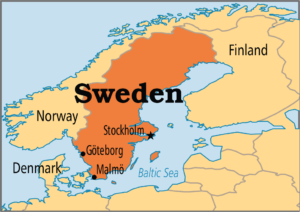
(From “Operation World Prayer Guide” and “Prayercast.com”
Sweden
Kingdom of Sweden
Europe
Geography
Area: 449,964 sq. km
The largest of the Scandinavian countries, a land of mountains and forests. Only 10% of the land is cultivated.
Population: 9,293,026 Annual Growth: 0.49%
Capital: Stockholm
Urbanites: 84.7%
HDI Rank: 7 of 182 (UN Human Development Reports 2009)
Peoples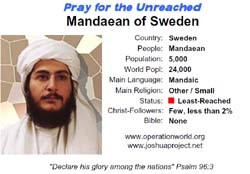
Peoples: 64 (14% unreached) All peoples
Unreached Peoples Prayer Card
Official language: Swedish, with five official minority languages Languages: 30 All languages
Religion
Largest Religion: Christian
|
Religion |
|
Pop % |
Ann Gr |
|
5,314,682 |
57.20 |
-0.7 |
|
|
642,248 |
6.9 |
-0.6 |
Sweden, the largest Scandinavian country in Northern Europe, has prospered from its political neutrality and prides itself on being a nation of equality. It has not been at war since 1814 and is one of the world leaders in gender equality. Described as “folkhemmet”, meaning the people’s home, Swedes take care of their own and place family first. Sweden is known for the safest food in the world and also boasts the lowest rate of traffic deaths. It is governed by a parliamentary democracy and is ruled by a monarch.
Stockholm, the capital, serves as the biggest port city in Sweden, and the majority of the Swedish population lives here. The nation is a highly developed, post-industrial society and has one of the best standards of living in the world. Education is free for all and is paid for by tax dollars. Taxes in Sweden are extremely high, and the average worker pays about 30 percent of their income and another 30 percent in hidden taxes.
The Church of Sweden (Lutheran) originated as a state church during the Protestant Reformation and continued being so until 2000, when the church and state were separated. As the nation has become increasingly liberal and secularized, the Church has endorsed same-sex marriage, universalism, and has questioned the divine authority of the Bible. Despite constitutional guarantees of freedom of religion, Christians are encountering more opposition by other religions for publicly acknowledging God. The current generation is growing up believing that the Church and God are not relevant to life, and it is pursuing materialism, hedonism, and individualism instead. Pray that the church will reawaken out of its spiritual slumber and shine brightly for God once more in a secular world.
Answer to Prayer
Increased unity among evangelicals is a praiseworthy outworking of the continued decline of state-sponsored Christendom and a sign of God’s Spirit at work. Evangelical groups from across the theological and denominational spectrums increasingly work, pray and worship together as they see themselves as a minority in a secular society. Each year at Pentecost, around 20,000 from around the country gather in Stockholm for “Jesus Manifestation”.
Challenge for Prayer
The Church of Sweden is no longer the State Church. Its size, political influence and social impact are large, but on the wane. Liberal theology and practice dominate the Church, from endorsing same-sex marriage to universalism and rejecting the divine authority of Scripture. Politicians (often without any clear faith in Jesus) are frequently chosen to sit on parish councils. Unsurprisingly, the Church is in numerical decline and attendance is between 1-2% of membership. On the local level, there are a number of evangelical congregations, pastors and members, but the national structures are dominated by a liberal agenda. Pray for God to shake and refine this Church. Movements such as Taizé, Oasis and Pilgrimage are having a positive and inspirational influence on the Lutheran Church.
PRAYER: Lord, we believe Your Word and choose to act accordingly. Help us to be people of faith like those in Hebrews Chapter 11. We are grateful for the ministry of the Holy Spirit, who convicts us of our sin and our need for Christ. We cling by faith to the merits of Christ’s suffering on our behalf on the cross, and to His victory over sin and death in the resurrection. We are grateful for the Spirit’s witness to our spirit, reminding us that we belong to You and have been blessed in Christ with every spiritual blessing. Our desire today is to press on to know You more, offering You fresh obedience as we walk in Your truth. In Jesus’ Name. Amen.
Pastor David
